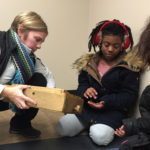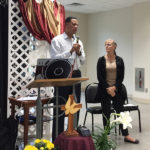By Lindsay Steele
On Nov. 1, 29-year-old Brittany Maynard chose doctor-assisted suicide in order to avoid prolonging her suffering from a fatal brain tumor.

Before her death, many Catholics spoke out, hoping she would allow God to choose the time of her demise. “Don’t give up hope!” said Portland Archbishop Alexander Sample, echoing Church teaching that life should be respected from conception to natural death.
Based on her testimony, she was afraid of what was to come — more so than her fear of death. She didn’t want to die, but if it was inevitable she didn’t want to suffer longer than she had to. She saw only pain, seizures and a loss of speech and mobility in her future.
From my experiences, both in watching my father die of Lou Gehrig’s disease and working in assisted-living facilities in high school and college, I believe that the fears Brittany experienced are typical of people who have been diagnosed with a terminal illness. At first, there is great sadness in knowing that death will soon come. People pray for miracles. Then, as they begin to accept death as inevitable, they begin to fear the suffering of illness, and pray that God won’t let them suffer too long.
The availability of doctor-assisted suicide in some states plays into this fear. It is a way of controlling a situation that seems uncontrollable. It’s as if the patient can then say, “Well, if I’m going to die, I want to do it on my terms.”
In theory, it seems like a tempting choice. I’ll never forget my father lying nearly paralyzed on his bed saying “dying is hard.” To see someone you love suffer like that is unbearable. However, there is still an opportunity for joy and love amidst the pain. One may not be in the constant state of despair and helplessness that Brittany foresaw.
Catholic theology professor Janet Smith, who cares for her mother with Alzheimer’s disease, says her mother still has the ability to give and receive love and experience joy at simple things like eating her favorite foods. Her illness has helped mend broken relationships among her children who now share a common goal of keeping their mother comfortable and safe. Blessed Chiara Badano, whose feast day was celebrated in October, used her time dying in a hospital in 1990 from a painful form of bone cancer to evangelize and offer compassion to other dying individuals.
My father, too, experienced moments of happiness during the progression of his disease. During the five months leading up to my father’s death, family and friends from all over came to keep him company. They planned benefits and gave him awards for the services he had offered to his place of work and his community. He was able to make amends with people whom he felt he could never forgive. People had an opportunity to tell him what a difference he’d made in their lives. He commented that few people ever get that opportunity and that while he wished he wasn’t dying he was appreciative of those precious moments.
Was dying fun? Not at all — it was hard enough to watch, and I’m sure it was infinitely harder for him. He was afraid of how much the disease would take from him before he passed away — much like Brittany. My father was most afraid of losing his ability to speak, which doctors said was inevitable. But he passed away in his sleep before losing that ability. We had prayed he wouldn’t suffer too much, and through this act of grace we believe God heard us.
I have no idea the entirety of what Brittany experienced. However, I hope others in Brittany’s shoes will know that their lives are still precious and that life can still be worth living.
(Editor’s note: Lindsay Steele is a reporter for The Catholic Messenger. Contact her at steele@davenportdiocese.org or by phone at (563) 888-4248.)












Thanks Lindsay for telling a very personal story of joys through process of death. Good job.
Lindsay, thank you for addressing this national and sensational story. I saw Brittany’s picture on the cover of a magazine focused on her youth, health and beauty. It implied to me that her assisted suicide is pioneering what the brave, new people now do when facing serious illness. It brings up so many questions of what our modern society is now celebrating. It’s like a photo shop to our life, ignoring God’s commandments.